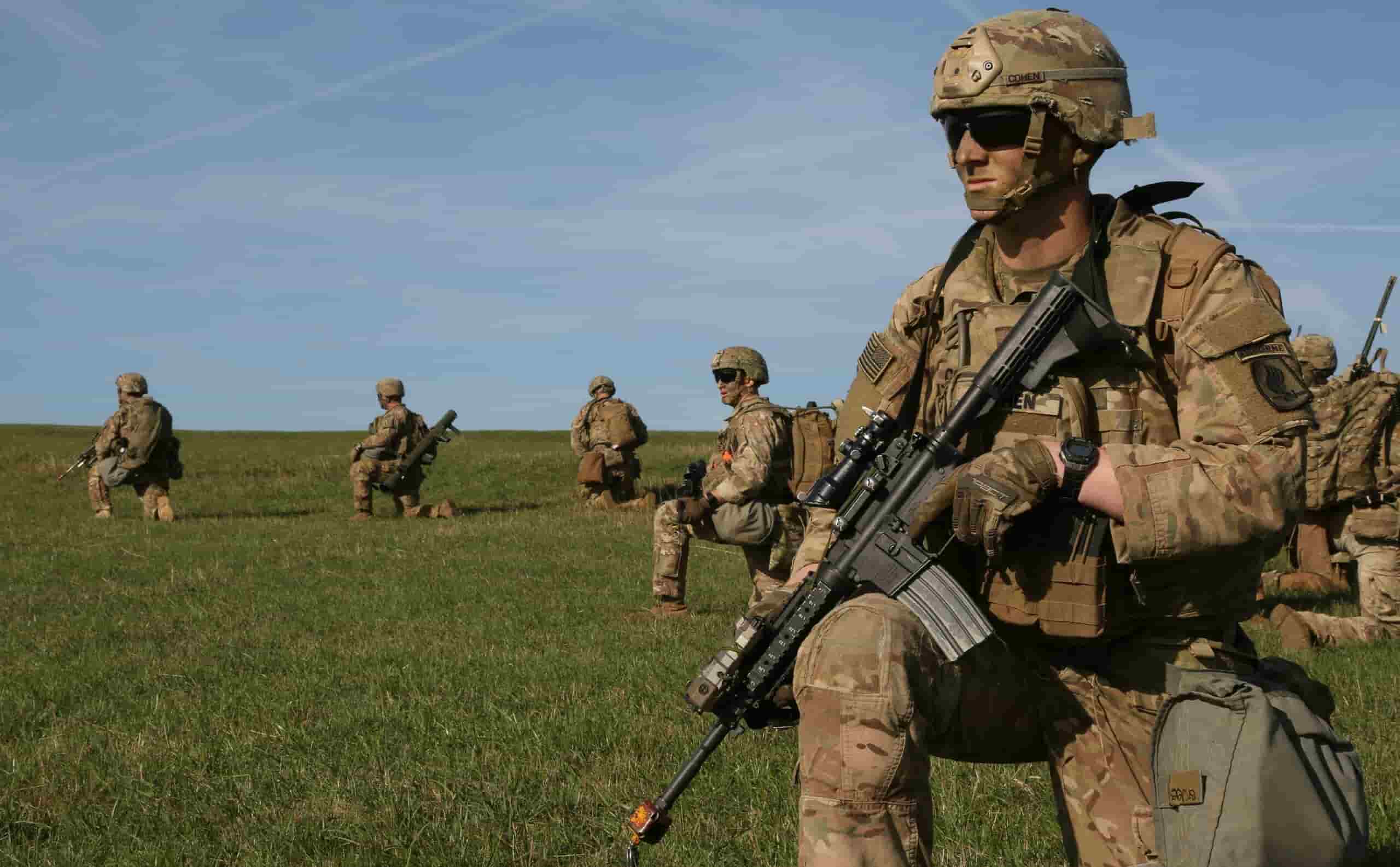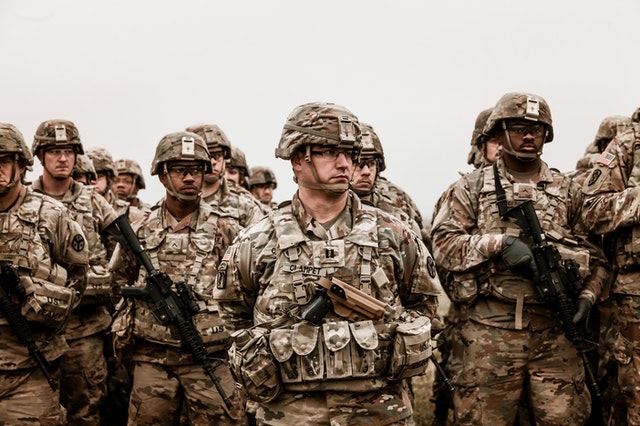The Army National Guard is the reserve component of the United States Army. It was created by combining state militia and Army reservists. Many people today are unsure of the requirements for joining the National Guard or what they must first accomplish.
The Army National Guard is a completely volunteer-led military force. Another name for them is “The People’s Army.” If you want to join the National Guard, here are some requirements. This article will answer any questions you may have about joining the National Guard, as well as provide information about National Guardsmen.
Let’s start practicing with our free ASVAB practice test 2024 if you’re about to take the ASVAB. Thousands of free National Guard ASVAB questions will help you become acquainted with the test format.
Army National Guard
The Army National Guard is community-based. Guardsmen must report to representatives of respective states unless they are called to protect U.S. interests in a period of conflict or natural disaster. They may also take part in international duties alongside full-time service members if necessary. Today’s National Guard comes from all U.S. states and regions. Each unit conducts its duties independently. Guardsmen take civilian jobs or even attend school during the period of conducting their military training part-time.
The Army National Guard is a branch of the Army that provides Army Reserve soldiers to federal and state governments. It currently has about 350,000 members who can serve as either full-time or part-time military personnel. To enroll in the Army National Guard, you must meet such certain requirements as being at least 17 years old (or 18 if enrolled with parental consent) and a US citizen for at least 3 years.
The definition of the citizen-soldier may be an attractive one for someone to explore –the opportunity to serve your country in uniform while still keeping a civilian job and life not far from home at.
When joining the National Guard, one of the very first concerns a potential candidate has to answer is whether or not the recruit has prior military service. Guard opportunities for prior-service military depend on the local Guard unit’s staffing needs and mission requirements. The reason we mention this is because not all who serve in the Guard live in the same physical proximity to a Guard base or unit.
National Guard Requirements
Those who have NOT prior service must meet the following requirements for joining the National Guard:
-
Citizenship requirements: To enlist, you must be a U.S. citizen or a resident alien (permanent resident) OR be nationalized to be a Reserve or National Guard officer.
-
Age requirements differ between branches of service, but in general, you must be between the ages of 17-35 with no prior service (NPS). The Guard experimented with raising the age to 42 but reverted to the lower age in 2011. Note: Seventeen-year-olds need parental consent. Or between the ages of 17 and 59 for those with prior service (PS) and can complete 20 years of creditable service for retirement by age 60.
-
Be at least a junior in high school, or hold a high school diploma or a GED certificate
-
Take and achieve the minimum required ASVAB scores.
-
Pass an Armed Forces physical examination and meet all medical, physical, and moral requirements
-
Must be available for initial active duty training.
-
Must agree to participate in an initial tour of active duty training of at least 12 weeks
These requirements would apply regardless of which state you want to serve in, and additional standards may apply depending on state law, changes to recruiting practices, executive orders, etc.
Prior service members who have more than 180 days in military service may wish to discuss with a Guard recruiter the ranks issued and what rank they should enlist in National Guard service. However, those requirements may be changed or adjusted depending on modifications or updates in military service regulations.
Those who choose to join the Armed Guard right after graduating high school have the option to attend “split training”, which is offered by the official Army Guard recruiting.
It’s Basic Combat Training during the summer. Parental consent in writing is required.
Army Guard Duration Commitments
Generally speaking, Army Guard time commitments are described as one weekend per month along with a two-week training period each year. For most of the training weekends, you’ll be with them Saturday and Sunday only, though occasionally you’ll be asked to report for duty on a Friday night.
The training is known as “Annual Training” and may require slightly longer times depending on the nature of your military job. Other considerations may apply, especially in times when the state requires the activation of Army Guard units.
Prior-service military members may be subject to different commitment requirements due to current policy and other factors.
How to join the U.S. National Guard?
Complete a contact form
Complete the application form, and a Guard recruiter will contact you to answer any questions you may have. Start the conversation with no obligations on your part.
Pass ASVAB Test
After you and your Guard Recruiter have determined that you are a good fit for the Guard, the next step is to pass the Armed Services Vocational Aptitude Battery (ASVAB) test, which specifies which jobs you are qualified for. If you have not already taken the ASVAB, you can find more information about it on this website. Contact a recruiter to identify when and where you can take the test.
Enlist
At this point, you will secure your ship date for Basic Combat Training, confirm your Guard position and pay, and take your Oath of Enlistment.
Option For Split Training
You enlist as a junior (you have to be 17 years old and have permission from a parent or legal guardian to enlist), complete that year, and attend Basic Combat Training during the summer between your junior and senior years.
Get Ready For Basic Training
You’ll attend the Recruit Sustainment Program (RSP) 1 weekend a month until you ship. RSP is all about preparing you to succeed in Basic Training, so you’ll gain knowledge about Guard rules and structure, as well as begin fitness and classroom training.
Ship Out
It’s Basic Combat Training time. You’ll be more powerful than you’ve ever been in 10 weeks and ready to join the team that protects America.
Army National Guard Benefits
Members of the Army National Guard are fairly compensated for all hours spent training, drilling, or being deployed. After joining the National Guard, members are allowed to train close to home while maintaining civilian careers or pursuing further education. This provides a valuable experience that benefits individuals at home and while serving.
U.S. ARMY BENEFITS
-
Home Loans.
-
Education.
-
Life Insurance.
-
Disability Compensation.
-
Pension.
-
Veteran Readiness and Employment (VR&E)
-
Health Care.
-
Burial.
BASIC TRAINING
You’re ready to start becoming a Soldier. In 10 weeks, you’ll be physically and mentally stronger than you’ve ever been, and ready to join the team that protects America.
GET READY
Most recruits are curious about Basic Combat Training (BCT). What is it like? What should I bring? How can I prepare? Along with support from your friends and family, you’ll need to set your personal affairs in order and bring only approved personal
BASIC COMBAT TRAINING
This 10-week sprint puts you on the road to greatness. You’ll meet your drill sergeant and learn the skills it takes to become a Soldier.
ARMY PHYSICAL FITNESS TEST
You’ll be required to pass the Army Physical Fitness Test (APFT) to graduate from BCT. Fitness is of critical importance in the Army National Guard, and only those who are in the best shape go further in their careers.
ADVANCED INDIVIDUAL TRAINING
After BCT, your life in the military begins. Advanced Individual Training (AIT) will teach you what you need to know to do your specific job (also called your Military Occupational Specialty or MOS).
What is the distinction between the National Guard and the reverses?
There are numerous parallels between the National Guard, the Air Force, and the Army Reserves. Both serve on a part-time basis while working civilian jobs or furthering their education. Unless called up for active duty, reservists and guard members adhere to a similar training regimen, which includes drill duty one weekend per month and a two-week annual training.
National Guard airmen and soldiers, like Reservists, are granted veteran status after serving in a war zone for 30 consecutive days. They are also eligible for a variety of other military benefits.
The distinction between the National Guard and the Reserves is found in the work they perform. Because members serve in their home state, the National Guard frequently refers to them as “citizen-soldiers.” The National Guard, unlike reserve forces, plays an important role in replying to domestic emergencies and humanitarian missions. The National Guard, for example, is named to respond to natural disasters, focus on providing law enforcement in volatile areas, and transport essential supplies both domestically and internationally.
Joining the National Guard – FAQs
What are my responsibilities as an Army National Guardsman?
The Army National Guard has a unique dual mission. Guardsmen’s domestic duty is to serve at a state level to protect communities. Besides, the Guard’s federal mission is to support active-duty military forces in handling threats abroad and disasters.
How long do you have to be in the National Guard?
eight years
The full National Guard service term is eight years. However, we offer several active service options within that time frame. For example, your child can commit to just three active years and then enter IRR (Individual Ready Reserve) for the remainder of their term.
Can I quit the National Guard?
The process may require some medical documents. Getting out of the Army for depression may be possible through a medical or disability discharge. According to the Army Times, in case you’re pregnant while in the Guard, you also have the option of leaving the service under honorable circumstances after your base physician verifies the condition.
Does the National Guard go to war?
The National Guard is composed of the Army National Guard and the Air Force Air National Guard. In times of war, Guard members can be mobilized and deployed to defend the country both domestically and overseas.
Do you come home after the National Guard basic training?
Soldiers are not permitted to return home after basic training and must instead attend school instruction to finish their Guardsmen training. So, be prepared for it!
Interested in Joining the National Guard?
If you want to join the National Guard, you’ve come to the right place. We can provide a wealth of informational knowledge as well as comprehensive practice tests to help you prepare for the upcoming ASVAB test. Let’s take a look at our free National Guard ASVAB practice test right now!

ASVAB General Science Study Guide In 2024
April 25, 2023

A Complete Pictorial History Of US Navy Uniforms From 1776 To 1967
Follow this article to find out the pictorial history of US Navy uniforms from 1776 to 1976 and beneficial information about US Navy uniforms as well!
March 9, 2022

Can An Immigrant Join The Army In The United States? [2024 Updated]
Can an immigrant join the Army? You do not have to be a U.S. citizen to enlist in the Army but you need to meet some requirements. Read this post to know more.
March 5, 2022



